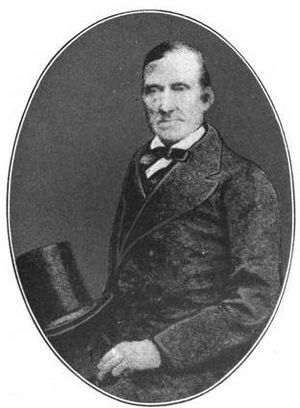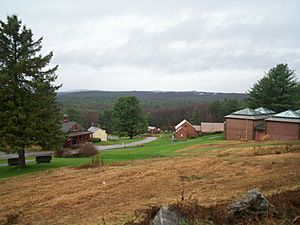Charles Lane (transcendentalist) facts for kids
Quick facts for kids
Charles Lane
|
|
|---|---|
 |
|
| Born | 1800 Hackney
|
| Died | 1870 |
| Occupation | Transcendentalist, writer |
Charles Lane (1800–1870) was an English writer and thinker. He was interested in ideas like Transcendentalism, which focused on spiritual and individual growth. He also believed strongly in ending slavery (he was an abolitionist). Along with his friend Amos Bronson Alcott, he helped start a special community called Fruitlands. Charles Lane was also an early supporter of a plant-based diet, known as veganism.
Contents
Early Life and Ideas
Charles Lane was born in Hackney, a place east of London, England. He worked as an editor for a financial newspaper called The London Merchant Current. He followed the ideas of a teacher named James Pierrepont Greaves. Lane also wrote for a famous magazine called The Dial, which was important for people who believed in Transcendentalism.
Starting Fruitlands
Charles Lane really admired Bronson Alcott, who was also a deep thinker. They met in 1842 when Alcott visited England. Alcott was looking for people to join him in starting a new kind of community in America. Lane decided to help and traveled back to the United States with Alcott.
In May 1843, Lane bought a farm in Harvard, Massachusetts. It was about 90 acres (36 hectares) and cost $1800. They moved to the farm on June 1 and named it "Fruitlands." They hoped to grow a lot of food there, even though the farm only had ten old apple trees. Alcott announced their new community in The Dial magazine, saying they wanted to free the land from being "owned" in the usual way.
Living at Fruitlands
The people at Fruitlands, who called themselves "the consociate family," wanted to live completely separate from the world's economy. This meant they tried not to trade with others and didn't use hired workers. They also believed that no one should own personal property.
A big part of their life was their diet. They wanted to grow all their own food and eat only plant-based foods. Lane wrote that they didn't eat things like coffee, tea, or rice unless they grew it themselves. They also avoided all animal products, including meat, butter, cheese, eggs, and milk. They mostly ate fruit and drank water. Some vegetables, like carrots and potatoes, were not allowed because they grew underground, which they thought showed a "lower nature."
The community also had strict rules about clothes. Lane and Alcott asked everyone to wear only linen clothes and canvas shoes. Cotton was forbidden because it was often made using slave labor. Wool was also banned because it came from sheep, and they believed animals should not be used. At first, they didn't want to use any animals, but they eventually allowed an ox and a cow on the farm.
Why Fruitlands Ended
The land at Fruitlands wasn't very good for farming. This led to food shortages, and people in the community became unhappy. Fruitlands ultimately failed in the winter after it opened. Charles Lane blamed Bronson Alcott for the failure, saying Alcott had been too optimistic. Lane and Alcott also disagreed on how the "consociate family" should work. Lane believed that people should give up marriage for a larger, shared family.
Life After Fruitlands
In January 1844, Charles Lane left Fruitlands with his son. They joined a local community of Shakers. Lane admired the Shakers' commitment to living simply and without marriage. He continued his work there but didn't stay long. He tried another community project in Red Bank, New Jersey, but it was also short-lived. In 1846, he returned to England, got married again, and had five more children.
Beliefs About Government
Charles Lane was a strong supporter of voluntaryism. This idea suggests that people should choose to follow rules and support society, rather than being forced by a government. He was friends with other famous thinkers like Ralph Waldo Emerson.
From January to June 1843, Lane wrote a series of nine letters. These letters were published in newspapers that supported ending slavery. In these letters, he described the government as using force and violence. He compared it to a church that uses a Bible in one hand and a sword in the other. Lane believed that if churches could be supported by people choosing to give money, then governments could also work based on people's voluntary choices. He hoped for a "voluntary State" where people were truly free.
Selected Writings
- A Classification of Sciences and Arts, Or, A Map of Human Knowledge, 1826
- A Dictionary, English and Burmese, 1841
- A Voluntary Political Government, 1843
- Life in the Woods, 1844
- Brook Farm, 1844
See also
 | John T. Biggers |
 | Thomas Blackshear |
 | Mark Bradford |
 | Beverly Buchanan |


